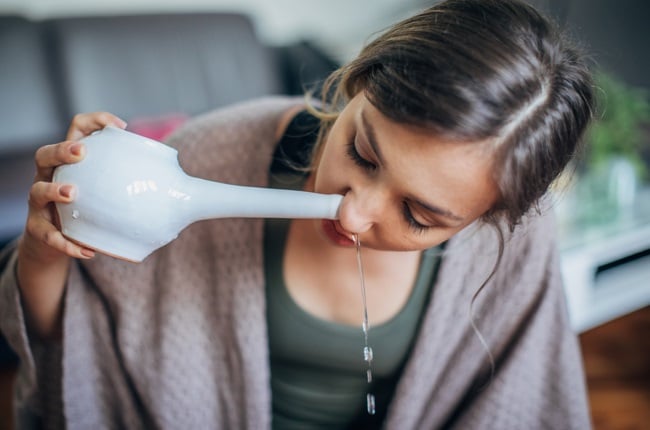
- Many of us only pay attention to our nasal passages during cold and flu season, but doctors say practising good nasal hygiene year-round is essential.
- This includes washing your hands, using a nasal saline rinse daily, and using a humidifier to prevent the sinuses from drying out.
- Bad nasal hygiene could put you at risk of sinus infections, which, if left untreated, could lead to complications.
How good is your nasal hygiene? Many of us only pay attention to our nasal passages in the colder months when we're more susceptible to colds and flu. However, Dr Mohammed Thandar, an ear, nose and throat (ENT) surgeon at Netcare St Augustine Hospital, says maintaining good sinus health should form part of your daily routine.
"Sinusitis can have varying causes. Most commonly, at this time of year, during cold and flu season, it is a viral infection such as influenza, rhinovirus, or respiratory syncytial virus. When the nasal passageways become swollen, obstructing the natural pathways for fluid drainage, a build-up of mucus occurs within the sinus, which can result in a secondary bacterial infection.
"Symptoms may persist for many weeks leading to chronic sinusitis and recurrent infections. Certain symptoms, such as a post-nasal drip that tracks down the back of the throat into the chest, can quite easily result in the development of bronchitis. It can also aggravate pre-existing conditions, such as asthma," explains Dr Thandar.
READ MORE | Trust your gut: Food allergy, intolerance, other things your tummy is trying to tell you
Aside from its unpleasant symptoms, sinusitis could also lead to serious complications if left untreated.
"Untreated acute sinusitis has been known to lead to orbital complications including eye pain, swelling of the eyelids, a bulging eye, visual changes and visual loss, as well as intracranial complications such as inflammation of the membranes and fluid surrounding the brain, resulting in severe headaches, a change in level of consciousness, seizures, and even coma. This can necessitate emergency surgery."
Dr Pradeep Soni, an ENT at Netcare uMhlanga Hospital, says that while serious complications from sinusitis may not be common, incorporating nasal hygiene into your routine is an important ongoing preventative measure.
Dr Soni recommends taking the following steps:
-Practice good hygiene by washing hands and avoiding contact with people who are sick.
-Use a nasal saline rinse daily to help keep sinuses clear of infection.
-Use a humidifier to prevent sinuses from drying out and becoming inflamed in dry, heated environments.
-Address dental problems to prevent oral infections from spreading to the sinuses.
-Quit smoking, as it irritates the sinuses and damages their normal drainage mechanism, thereby increasing the risk of infections.
-Avoid allergens. Allergies are a trigger of sinusitis for many people, and it is important to limit exposure to allergens -- which may range from dust mites to pollens, animals, grass and others. Controlling your allergies, as indicated by your healthcare professional, will also prove helpful.
"People with weakened immune systems, such as those with diabetes, HIV and cancer, are more susceptible to sinusitis, but it is an extremely common condition among the entire population and affects millions of people globally. It is, therefore, advisable for everyone to practise good nasal hygiene all year round," says Dr Soni.
READ MORE | What does smoking do to your teeth? An oral hygienist breaks it down
What can you do if you get a sinus infection?
There are some things you can try at home to treat a sinus infection and prevent it from worsening.
"Use a nasal saline rinse twice daily to gently clear the passageways and help to reduce congestion. Apply warm compresses to the face, as this can help to reduce facial pain, and drink plenty of fluids to thin the mucus and encourage better drainage," advises Dr Soni.
If your sinusitis continues to worsen, visit your GP, who will be able to prescribe treatment.
"It can be the case that intervention is required to address any nasal abnormalities, such as a deviated septum or polyps, that may be causing blockages. In some cases, endoscopic sinus surgery may be required to improve the drainage going forward," says Dr Soni.
READ MORE | We brrrreak it down: This is why you're more likely to catch a cold in winter
If you suffer from ongoing sinusitis, it could be due to other underlying causes like structural issues with the nasal passage or allergens in your home.
"Allergy testing and treatment have come a very long way in recent times. Testing is done through skin tests or blood tests -- once identified it can help with allergen avoidance and, where possible, modify the immune system to effectively cure the allergy," notes Dr Thandar.
"This is done with immunotherapy or desensitisation over a period of a few years. However, the way that this therapy is administered is much easier now than it was ten years ago when patients used to be subjected to weekly injections with a risk of anaphylaxis or shock. Nowadays, it is simply done with a spray under the tongue at home, and there is minimal risk.
"I strongly recommend that those suffering ongoing sinusitis should look into finding a long-term solution, as this seemingly insignificant condition is not only uncomfortable to live with but can over time, lead to bigger healthcare concerns," he concludes.




 Publications
Publications
 Partners
Partners












